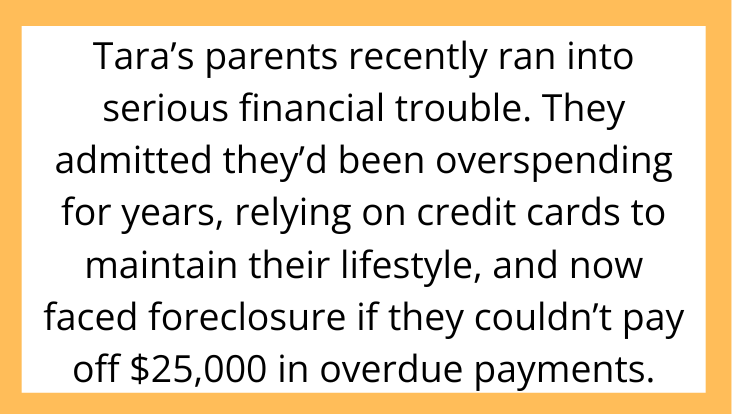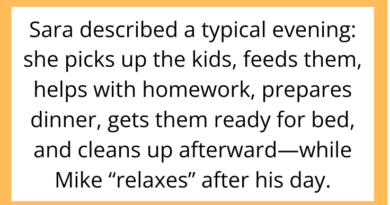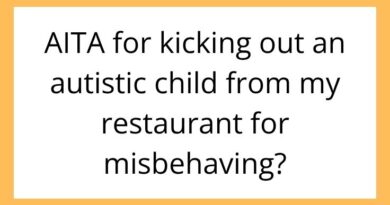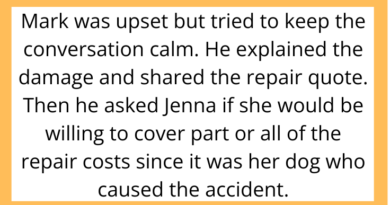AITAH for Refusing to Give My Parents Access to My Emergency Savings?
When it comes to family, everyone expects a little help in tough times. But where’s the line between being supportive and being taken advantage of? In today’s AITAH scenario, a young professional finds themselves at odds with their own parents over money—and the fallout has left everyone questioning who is actually in the wrong.
Let’s dive in.
The Situation: A Lifetime of Saving for Security

The original poster—let’s call her Tara—is 28 years old and has always been careful with money. She worked two jobs after college to pay off her student loans early. Once debt-free, she made it her mission to build a solid emergency fund.
After years of sacrifice, Tara managed to save nearly $40,000—enough to cover rent, bills, and essentials for at least a year if she ever lost her job. This fund gave her peace of mind, especially because she works in a volatile industry.
Everything was fine—until her parents came calling.
The Request: A Loan That Felt Like a Demand

Tara’s parents recently ran into serious financial trouble. They admitted they’d been overspending for years, relying on credit cards to maintain their lifestyle, and now faced foreclosure if they couldn’t pay off $25,000 in overdue payments.
They came to Tara, insisting she help them out. They argued that family supports each other no matter what and that she was lucky to have savings when they did not. Her father even told her she “owed” them because they’d supported her for 18 years.
Tara felt torn. On the one hand, she sympathized with their situation. On the other, she had spent nearly a decade building that safety net and worried that draining it would jeopardize her own future security.
She offered to contribute $5,000—an amount she felt comfortable giving—but her parents were offended. They called her selfish and cold-hearted. Extended family piled on, sending angry messages and accusing her of abandoning her parents in their hour of need.
Feeling overwhelmed and guilty, Tara turned to the internet to ask: Am I the villain here?
The Case for Tara: Boundaries Are Not Betrayal

Many commenters on r/AITAH supported Tara and pointed out important truths:
-
Financial Responsibility Isn’t Contagious: Just because someone else spends recklessly doesn’t obligate you to rescue them.
-
Emergency Funds Are for Emergencies—Your Own: The purpose of an emergency fund is to protect yourself from hardship.
-
Partial Help Is Still Help: Offering $5,000 is generous. The fact it wasn’t everything doesn’t make it nothing.
-
Guilt Trips Don’t Equal Entitlement: Emotional manipulation shouldn’t dictate serious financial decisions.
One commenter summed it up perfectly:
“Their crisis doesn’t erase your right to feel safe and secure.”
The Case for Her Parents: Family Above All

Not everyone sided with Tara. A smaller contingent of commenters felt her parents deserved more empathy:
-
They Raised Her: Parents often make sacrifices for their kids. Some felt Tara’s security was, in part, thanks to their support.
-
It’s a Home at Stake: Foreclosure could leave them homeless, which is arguably an emergency.
-
Family Obligations: In many cultures, children are expected to take care of aging parents, even if it means personal sacrifice.
These perspectives raised a valid question: at what point does self-preservation cross into coldness?
The Bigger Question: Where’s the Line?

This story highlights an uncomfortable reality: financial boundaries are hard to set, especially when family is involved. But they are necessary. Here are some takeaways anyone in this situation should consider:
-
Your Security Matters Too: You can’t help anyone if you end up in crisis yourself.
-
Guilt Is Not a Strategy: If someone uses shame to get money, step back and think critically.
-
Partial Support Is Valid: Just because you can’t fix everything doesn’t mean you shouldn’t offer anything—but you get to define what you’re comfortable giving.
-
Long-Term Solutions Beat One-Time Bailouts: Even if Tara emptied her savings, her parents’ spending habits might recreate the same problem later.
What Should Tara Do?

Many readers encouraged Tara to:
-
Hold firm on her boundary.
-
Offer non-financial help (like helping negotiate with creditors).
-
If she does contribute, set clear terms (like a repayment plan or agreement that this is a one-time gift).
Ultimately, it’s her decision—and no one else is entitled to her money just because she has it.
Takeaway: You’re Not Automatically the Villain for Saying “No”

Refusing to sacrifice your own safety net doesn’t make you heartless. It means you understand the importance of balance—helping where you can, but not to the point of self-destruction.
Family loyalty is important. But so is your mental health, your stability, and your future.



